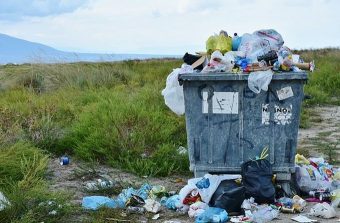
Last year, China—the world’s largest importer of waste—announced it no longer wanted to take in other countries’ trash so it could focus on its own pollution problems.
This unexpected policy shift, which took effect Jan. 1, has left exporters in the U.S., Canada, Ireland, Germany and other European countries scrambling for solutions for their growing mountains of trash, the New York Times reported.
But rather than using this as an opportunity to improve and reshape domestic waste management and to force manufacturers to produce less waste, Washington has asked Beijing to reverse the ban.
On Friday, a U.S. representative at the World Trade Organization’s (WTO) Council for Trade in Goods expressed concerns that China’s foreign waste ban could cause a fundamental disruption in global supply chains for scrap materials, Reuters reported.
“We request that China immediately halt implementation and revise these measures in a manner consistent with existing international standards for trade in scrap materials, which provide a global framework for transparent and environmentally sound trade in recycled commodities,” the official said at the meeting in Geneva.
“China’s import restrictions on recycled commodities have caused a fundamental disruption in global supply chains for scrap materials, directing them away from productive reuse and toward disposal.”
The request will likely fall on deaf ears amid President Donald Trump’s threat to impose penalties on up to $60 billion in Chinese imports. He has also called China an “economic enemy” of the U.S. and announced steep tariffs on solar panels, steel and aluminum imports.
China’s regulation, announced last July, is designed to reduce the country’s environmental pollution by banning 24 types of imported waste, including plastics, mixed paper, mining slap and discarded textiles.
“The concerns are neither reasonable nor have any legal basis,” Foreign Ministry spokesperson Hua Chunying said at a daily press briefing in response to the U.S. official’s remark.
“It’s very hypocritical of the U.S. to say China is breaching its WTO duty,” Hua said. She noted that the if the U.S. thought it legitimate to restrict exports of high-tech and high-value-added products, then China’s ban on foreign waste imports was not illegal.
“Restricting and banning the imports of solid waste is an important measure China has taken to implement the new development concept, improve environmental quality and safeguard people’s health,”
Hua said, adding that the Basel Convention allows countries the right to restrict the entry of foreign waste.
“We hope that the U.S. can reduce and manage hazardous waste and other waste of its own and take up more duties and obligations.”
The U.S. sends 13.2 million tons scrap paper and 1.42 million tons of scrap plastics to China every year.
Governments around the world are waking up to the scourge of plastic pollution and have implemented rules to stem the flow of plastic bags, bottles and other single-use items that clog landfills, pollute oceans and harm marine life.
While other developing countries such as Malaysia and Vietnam take foreign waste, Greenpeace East Asia noted that no other countries’ waste services have the same capacity as China’s.
The environmental organization said that waste-exporting countries will ultimately have to face waste problems at home. The ban should also prompt better waste management and recycling infrastructure in both exporting countries and China itself.
Greenpeace is also urging manufacturers of disposable products to take responsibility for their products through their entire life-cycle and invest in sustainable alternatives.
“This regulation will send shockwaves around the world, and force many countries to tackle the ‘out of sight, out of mind’ attitude we’ve developed towards waste,” said Greenpeace East Asia plastics campaigner Liu Hua in December.
“The world cannot continue with the current wasteful consumption model based on infinite growth in a finite world. Rather than find new places to export waste, governments and the private sector must find ways to simply reduce the amount of waste we are creating.”
Source: ecowatch.com

